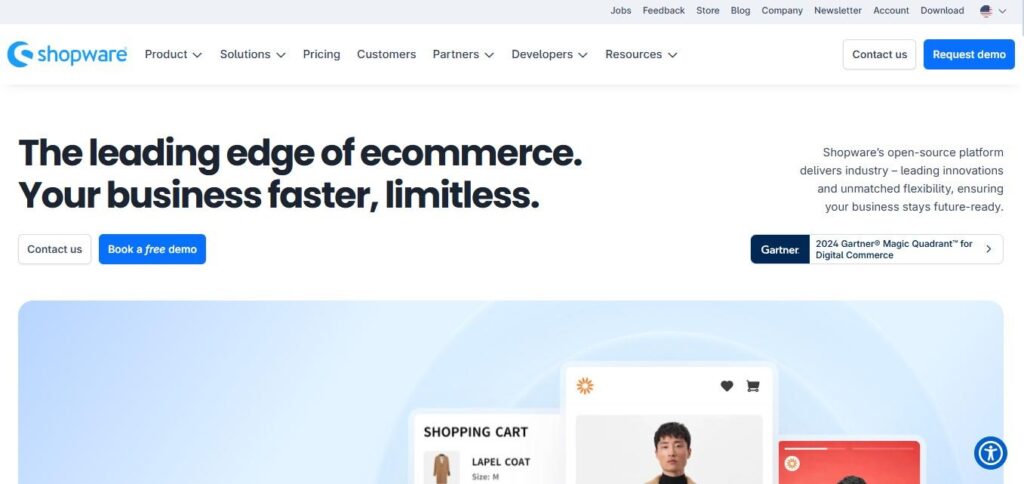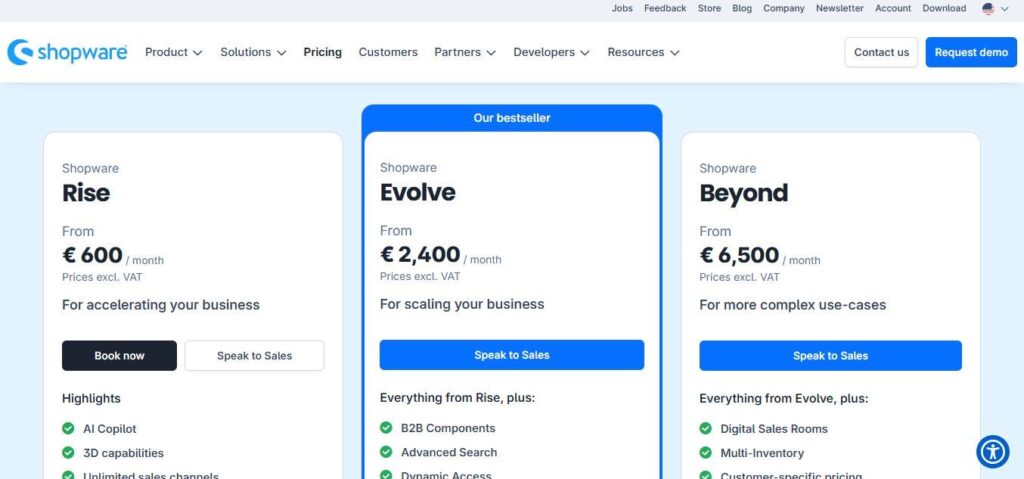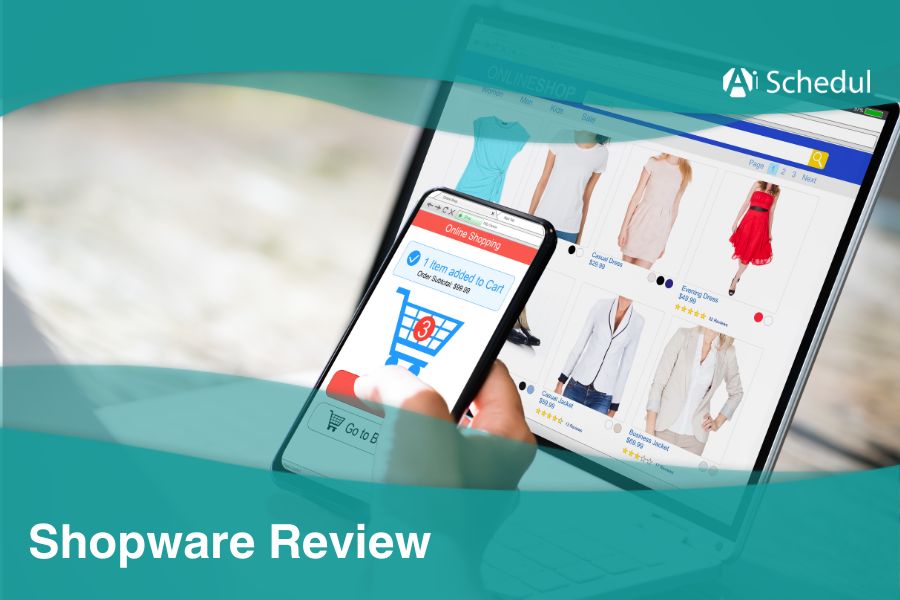Is your luxury brand ready to elevate its digital presence to the next level? Imagine a platform that not only showcases your products but also tells your brand’s story in a captivating, immersive way. Enter Shopware, the German-engineered e-commerce solution designed for luxury item merchants seeking unparalleled customization and engagement.
Here’s a deeper look into Shopware’s features, benefits, and considerations for the luxury sector.
Table of Contents
ToggleWhat Is Shopware?
Shopware is an open-source e-commerce platform developed in Germany. It provides businesses with a flexible solution for creating and managing online stores. The platform is known for its scalability, allowing merchants to adapt it to a variety of business needs, whether for a small business or a larger operation.
Shopware offers a high degree of customization, which can be useful for businesses that need specific features or functionality. It integrates content with commerce, enabling merchants to combine product listings with rich media, such as images and videos. While the platform is particularly suited for more complex e-commerce needs, it also provides the tools necessary for setting up and running an online store efficiently.
It’s a popular choice for businesses looking for control over their online store, as it allows for significant customization of design and functionality.
Key Features Relevant to Luxury Brands
Let’s review some of the key features of Shopware that are particularly relevant to luxury brands:

#1 Shopping Experiences (Content & Commerce)
This is a standout feature allowing merchants to seamlessly integrate rich content (storytelling, lookbooks, videos, high-quality imagery) with product listings on landing pages, product detail pages, and category pages. This is crucial for conveying the brand narrative and the value proposition of luxury items.
#2 Drag-and-Drop Editor
Non-technical users can create visually appealing and unique page layouts without coding.
#3 Product Streams
Dynamically display curated product selections based on various criteria, enhancing cross-selling and upselling opportunities.
#4 Visual Storytelling
Enables brands to create immersive experiences that go beyond simple product displays, akin to a digital boutique. Add that to collaborating with fashion influencers, and luxury brands can reach new, discerning audiences in a personalized, highly engaging way.
#5 High-Quality Media Support
Shopware is well-suited for showcasing high-resolution images, 360-degree product views, and embedded videos, essential for highlighting the details and craftsmanship of luxury goods.
#6 Customization and Flexibility
As an open-source platform, Shopware offers extensive customization options at the code level. This allows luxury brands to create highly bespoke storefront designs and functionalities that perfectly align with their brand identity.
#7 Theme Development
While pre-made themes are available, the platform allows for the creation of completely custom themes to achieve a unique and premium aesthetic in digital marketing.
#8 API-First Approach
Facilitates seamless integration with other essential tools and services, such as CRM, ERP, and specialized luxury brand management software.
#9 Configurable Products (Variants)
Easily manage products with multiple attributes like size, material (e.g., gold, platinum), and gemstones, with individual pricing and inventory tracking.
#10 Product Bundles
Offer curated sets of luxury items.
#11 Custom Products
Allows for personalized product offerings (e.g., engravings, custom configurations).
#12 Personalization
Features like customer streams and the rule builder allow for personalized content display, targeted promotions, and tailored shopping experiences based on customer behavior and preferences. This is key for engaging high-value clients.
#13 Multi-Store Functionality
Ideal for luxury brands with different product lines, collections, or international presence, allowing management of multiple storefronts from a single backend.
#14 B2B Capabilities (in higher-tier plans)
If the luxury brand also engages in wholesale, Shopware offers advanced B2B features like customer-specific pricing, quote management, and budget controls.
#15 SEO Optimization
Built-in SEO tools help improve the visibility of luxury products in search engines, attracting organic traffic from discerning customers.
#16 Performance and Scalability
Shopware is designed to handle growing businesses and large product catalogs, ensuring a smooth and fast browsing experience for customers.
#17 Shopware App Store
Yes, Shopware has a comprehensive App Store (or Shopware Store) where merchants can find a wide range of extensions and plugins to further enhance their store’s functionality. These apps cover various categories relevant to luxury businesses, including:
- Marketing & Personalization: Advanced personalization tools, email marketing integrations, loyalty programs.
- Store Design & UX: Enhanced product presentation features (e.g., 3D/AR), advanced search functionalities, premium theme extensions.
- Customer Service: Live chat, personalized support tools.
- Payments & Shipping: Integrations with various payment gateways and specialized shipping options for high-value goods.
- Analytics & Reporting: Tools to understand customer behavior and sales trends.
Pricing
Shopware offers different pricing models, including cloud-hosted and self-hosted options. The cloud plans are generally subscription-based and tiered, with increasing features and support levels. As of late 2024/early 2025, the main cloud plans are:

- Rise: Suitable for growing businesses, offering a good balance of features. Pricing starts around €600/month (billed annually).
- Evolve: Designed for more advanced needs with greater scalability and B2B features. Pricing is from €2,400/ month.
- Beyond: The enterprise-level plan with the full suite of features and dedicated support. Pricing is from € 6,500/ month.
There is also a self-hosted, open-source Community Edition, which is free to download and use. However, it requires technical expertise for setup, hosting, security, and maintenance. While cost-effective initially, the total cost of ownership can increase with the need for developers and paid extensions.
Benefits of Using Shopware
Shopware offers a wide array of advantages that make it particularly suitable for luxury e-commerce merchants:
- Seamless integration of content and commerce for immersive storytelling
- High customizability for brand-aligned design and functionality
- Strong visual and media capabilities tailored to showcasing luxury goods
- Personalization tools for a tailored customer experience
- Scalable performance and robust multi-store and B2B features
- SEO and marketing tools to boost organic visibility
- Rich ecosystem of extensions via the Shopware App Store
Considerations for Luxury Item Merchants
- Technical Expertise: While Shopware’s backend is user-friendly, deep customization often requires development knowledge. Luxury brands might need to invest in in-house developers or partner with Shopware agencies.
- Initial Setup Time: Compared to simpler platforms, setting up a highly customized Shopware store can take more time and effort.
- Cost: While the Community Edition is free, the paid cloud plans can be more expensive than some other platforms, especially as you scale and require more advanced features. However, the lack of transaction fees on most payment gateways in the paid plans can offset this for high-value items.
- Focus on Visuals: While Shopware excels in visual presentation, luxury brands need to ensure they invest in professional photography and videography to truly showcase their products.
In Conclusion
Shopware presents a powerful and flexible platform for luxury item merchants who require a high degree of customization, advanced merchandising features, and the ability to create unique and engaging brand experiences.
Its “Shopping Experiences” feature, open-source nature, and robust app store make it a strong contender for brands that want more control and a tailored solution compared to out-of-the-box platforms. However, it’s essential to consider the technical expertise and potential costs associated with development and the chosen pricing plan.
FAQs
1. What Makes Shopware Different From Other E-commerce Platforms Like Shopify?
Shopware stands out due to its open-source nature, offering more flexibility and customization than platforms like Shopify. It is ideal for businesses with complex needs, especially luxury brands that require high-quality media, advanced product presentation, and a tailored shopping experience. Unlike Shopify, which is more user-friendly for those without technical knowledge, Shopware often requires technical expertise to fully leverage its customization options.
2. Is Shopware Suitable for Small Luxury Brands or Only Large Enterprises?
While Shopware is scalable and caters to large enterprises, its flexible, customizable features make it equally suitable for small luxury brands. The self-hosted Community Edition offers a low-cost starting point for small businesses, though they may need to invest in developers to take full advantage of its advanced customization capabilities.
3. Does Shopware Support Mobile E-commerce?
Yes, Shopware is fully responsive and optimized for mobile e-commerce. With the increasing trend of mobile shopping, luxury brands can ensure that their websites provide a smooth and high-quality experience across all devices.

